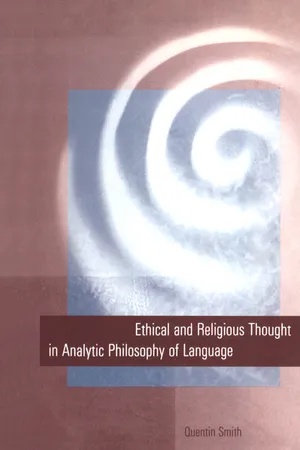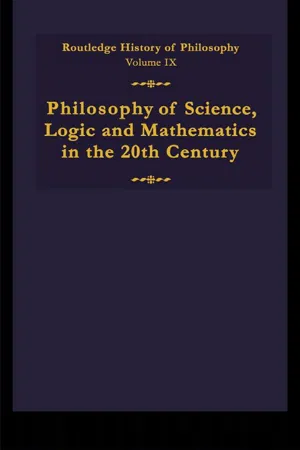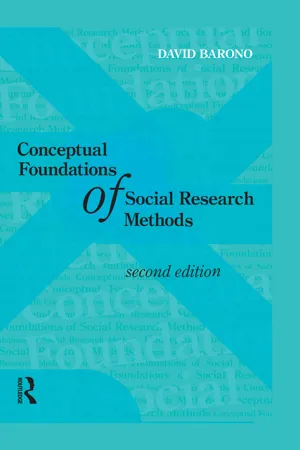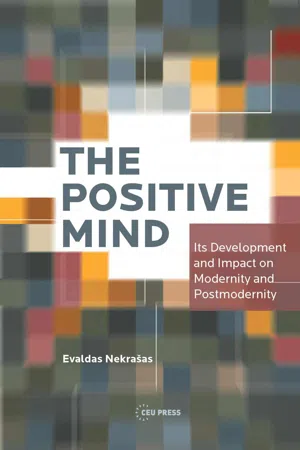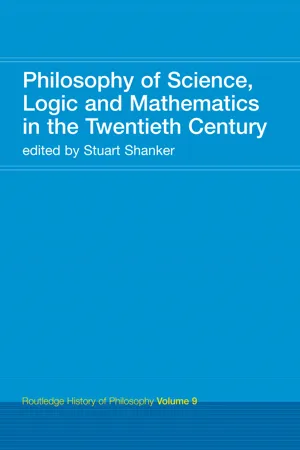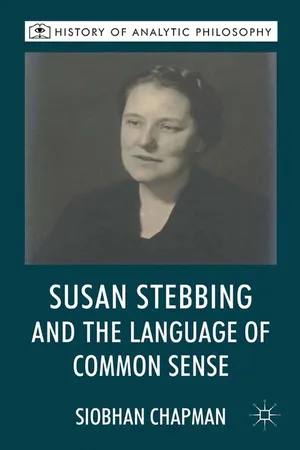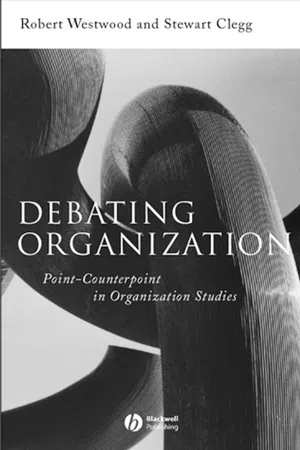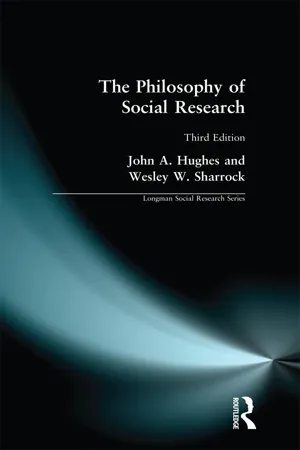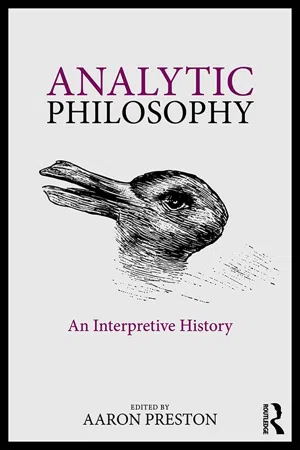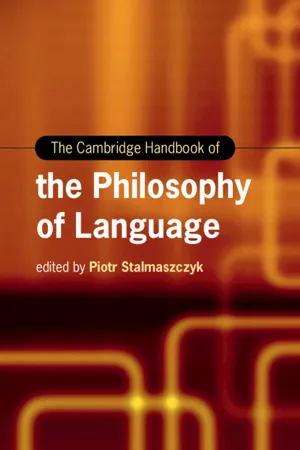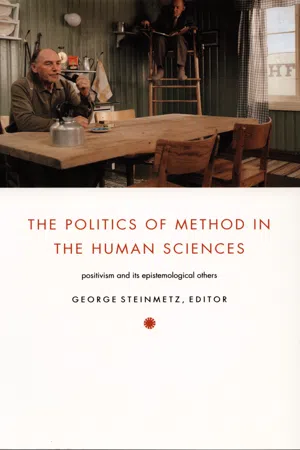Languages & Linguistics
Logical Positivism
Logical positivism is a philosophical movement that emphasizes the importance of empirical evidence and logical analysis in understanding the world. It asserts that meaningful statements must be verifiable through observation or logical reasoning. In the context of languages and linguistics, logical positivism has influenced the development of theories that prioritize empirical evidence and logical analysis in the study of language.
Written by Perlego with AI-assistance
Related key terms
1 of 5
12 Key excerpts on "Logical Positivism"
- Gary W. Ladd(Author)
- 1998(Publication Date)
- Yale University Press(Publisher)
2 Logical Positivism 5. The Logical Positivists' Method of Linguistic Analysis The movement known as Logical Positivism reached full flower in the 1920$ but was based on ideas going back to 1905 and earlier. At least four major developments in analytic philosophy served as catalysts of the logical positivist movement. The first occurred in 1905 with the publication of Russell's On Denoting, which showed how sentences with proper names or definite descriptions can be translated into sentences with bound variables and predicates. This enabled Russell to reject his early logical realist tenet that the sense of proper names is their referent and the associated implication that there are things that do not exist. If the sense of Pega-sus is not its referent, we do not need to assume there is some nonexistent being Pegasus in order to explain how this name has a sense. A second major impetus was Russell's paper of 1908 on the theory of types, in which he argued that sentences that violated the type-restrictions are senseless. The property of triangularity is female is senseless because being female is restricted to individuals, not universals. This doctrine exemplifies a procedure for discrediting certain sentences not as false but as senseless, a procedure that would play a central role in positivist theories. A third impetus was manifest in Alfred North Whitehead's and Russell's Principia Mathematica, in which mathematical concepts were argued to be logical con-structions from logical concepts. A number could be defined in terms of sets and such logical concepts as identity. This introduced the important notion of logical construction, a notion that was also used in an influential way in Russell's Our 20 Logical Positivism 21 Knowledge of the External World, which endeavored to show that physical things were logical constructions from sensory experiences.- eBook - ePub
Routledge History of Philosophy Volume IX
Philosophy of the English-Speaking World in the Twentieth Century 1: Science, Logic and Mathematics
- S. G. Shanker(Author)
- 2003(Publication Date)
- Routledge(Publisher)
It was claimed by members of the movement that they had noticed something about existing and traditional philosophy, which would completely overturn it and render it largely otiose. There appeared articles with such titles as ‘The Elimination of Metaphysics through the Logical Analysis of Language’ (Carnap [5.5]) and ‘The Turning Point in Philosophy’ (Schlick [5.24]). Carnap posed the question: ‘Can it be that so many men, of various times and nations, outstanding minds among them, have devoted so much effort, and indeed fervour, to metaphysics, when this consists of nothing more than words strung together without sense?’ International conferences were called with a view to disseminating the new ‘insights’, and a grandiose project, The Encyclopedia of Unified Science, was launched to give definitive expression to the new ‘scientific’ era in which philosophical and other discourse would become part of the discourse of science. In these circumstances it was not surprising that critics of the new ideas were more than usually prompt, forthright and thorough in their criticisms. Nevertheless, Logical Positivism has an established place in the history and continuing development of philosophy. At least three reasons might be given for this. One is purely historical, regarding the considerable impact and influence of the movement in its heyday. A second lies in the intrinsic interest of its ideas, which I hope to bring out in what follows. A third lies in the fact that even if no one today would call himself a logical positivist, some of its main positions, such as verificationism, and emotivism in ethics, are still referred to as parameters within which discussions of particular topics, such as ethics or the philosophy of religion or of science, are to be conducted. Again, it can be argued that even if the parent plant is dead, many of its seeds are alive and active in one form or another - David Baronov(Author)
- 2015(Publication Date)
- Routledge(Publisher)
The purpose of this chapter, therefore, is to examine Logical Positivism as a distinct moment in the long life of positivism. At the core of Logical Positivism is a near-obsessive focus on the use of language within scientific inquiry. This grew out of a simmering disquiet in the early twentieth century regarding the meaning and validity of scientific statements. The problem was no longer determining what was true and what was false. The problem was finding a meaningful and universal language to convey what was true and what was false. In this regard, the work of Ernst Mach (1838–1916) and Richard Avenarius (1843–1896) in the realm of empiricism and that of Bertrand Russell (1872–1970) in the realm of logic provide essential bridges between nineteenth-century embryonic positivism and twentieth-century Logical Positivism. As evidence of the varied and at times confusing interpretations of positivism in the latter nineteenth century, all three of these contributors actively dissociated themselves from the term “positivist.”All of the issues and debates discussed in this chapter can be considered foundational for the practice of standard social science research today. Of all the chapters of this book, however, the present chapter concerns an intellectual movement whose proponents made the fewest explicit links to the social sciences. The early proponents of Logical Positivism took the physical sciences as their immediate subject of concern. It was not until later, by means of gradual extension, that the arguments of Logical Positivism were systematically applied to the social sciences.WHAT ARE THE ORIGINS OF LOGICAL POSITIVISM ?
Logical Positivism emerged, in large measure, from the gallant efforts of Ernst Mach and Richard Avenarius to purge the last surviving remnants of subjectivity from scientific inquiry. Of particular concern was the extent to which the individual characteristics of an investigator were allowed to influence a study’s results. Such results would be unique to the individual investigator and thus would not constitute a general finding—the essential building block of scientific knowledge. Efforts to eliminate the influence of the individual investigator within scientific inquiry are referred to as empiriocriticism.The goal of empiriocriticism is to represent phenomena as they truly are, through “pure experience”—untainted by the role of the investigator. Importantly, proponents of Logical Positivism do not advocate a retreat to pure objectivism. This would suggest a utopian vision, completely separating the investigator from the research process. Rather, there is an attempt to clearly define and narrowly circumscribe the role of the investigator within scientific inquiry. Within this framework, the investigator does not represent a passive reflection of reality but remains an active agent in the production of knowledge.- eBook - PDF
The Positive Mind
Its Development and Impact on Modernity and Postmodernity
- Evaldas Nekrašas(Author)
- 2016(Publication Date)
- Central European University Press(Publisher)
However, in the development process of the philosophy of Logical Positivism, the emphasis has been shifting gradually from the questions related to the problem of meaning to those of methodology, especially those related to the evalua-tion of scientific hypotheses. One of the reasons for this shift was meeting the practical needs of the factual sciences. Another was the difficulties logical positivists faced when confronted with the question of the very status of the criterion of meaning. Opponents of Logical Positivism were quick to ask “Is the prin-ciple of verification itself verifiable?” It was clear that it is neither an ana-lytic, nor contradictory, nor a factual statement. Yet, critics claimed, logi-cal positivists admit of no other category of statements. There were some possibilities to counter this claim, say by referring to the differences be-tween object language and metalanguage. Yet even in this case the prob-lem remained: determining the grounds for adopting this principle. The principle was directed against metaphysics. But it was rather difficult to convince metaphysicians to adopt it by proving this principle in one or another way. And if it is only a kind of code suggested by positivists, then metaphysicians may simply reject it. The fledgling Logical Positivism of the twenties and early thirties was a very militant philosophy having ambitions to eradicate metaphysics altogether. Yet soon it became clear that metaphysics is much more re-silient than logical positivists surmised. Logical analysis proved a dou- 188 Part One: Development ble-edged sword: the supposedly deadly weapons were all too deadly for science, as was the case with the most radical version of the principle of verifiability which was incompatible with the interpretation of laws of nature as assertions. Yet turned against metaphysics they were unable to strike a death blow. - eBook - ePub
Philosophy of Science, Logic and Mathematics in the 20th Century
Routledge History of Philosophy Volume 9
- Stuart G. Shanker(Author)
- 2023(Publication Date)
- Routledge(Publisher)
It was claimed by members of the movement that they had noticed something about existing and traditional philosophy, which would completely overturn it and render it largely otiose. There appeared articles with such titles as ‘The Elimination of Metaphysics through the Logical Analysis of Language’ (Carnap [ 5.5 ]) and ‘The Turning Point in Philosophy’ (Schlick [ 5.24 ]). Carnap posed the question: ‘Can it be that so many men, of various times and nations, outstanding minds among them, have devoted so much effort, and indeed fervour, to metaphysics, when this consists of nothing more than words strung together without sense?’ International conferences were called with a view to disseminating the new ‘insights’, and a grandiose project, The Encyclopedia of Unified Science, was launched to give definitive expression to the new ‘scientific’ era in which philosophical and other discourse would become part of the discourse of science. In these circumstances it was not surprising that critics of the new ideas were more than usually prompt, forthright and thorough in their criticisms. Nevertheless, Logical Positivism has an established place in the history and continuing development of philosophy. At least three reasons might be given for this. One is purely historical, regarding the considerable impact and influence of the movement in its heyday. A second lies in the intrinsic interest of its ideas, which I hope to bring out in what follows. A third lies in the fact that even if no one today would call himself a logical positivist, some of its main positions, such as verificationism, and emotivism in ethics, are still referred to as parameters within which discussions of particular topics, such as ethics or the philosophy of religion or of science, are to be conducted. Again, it can be argued that even if the parent plant is dead, many of its seeds are alive and active in one form or another. In an interview in 1979, A. J - eBook - ePub
- S. Chapman(Author)
- 2013(Publication Date)
- Palgrave Macmillan(Publisher)
The logical positivists allowed that a statement was meaningful in three separate cases: if it was analytic, the meanings of the individual words it contained making it necessarily true, determined by the language itself: if it was a statement of logic or mathematics, which Whitehead and Russell had demonstrated could be seen as tautologous formulas within a closed system: or if it made a claim about the world that was amenable to being verified by experience or observation. All statements that did not fall into one of these three categories were simply meaningless and fit only to be dismissed from serious philosophical discussion. This included statements of religious belief or ethical judgement. It also included the statements of metaphysics. There was, for instance, no objective way of verifying the claim that the world was composed of basic facts. The difference over metaphysics reflects a difference in the basic purpose or motivation of the logical atomists and the logical positivists in conducting analysis. For the atomists the purpose of analysis was to move from the imperfections of ordinary language to a better form of words that would offer a more precise picture of the structure of the world. The positivists were generally scientists by training and by inclination. Their ambition was a language, as unlike ordinary natural language as was necessary, that could precisely and unambiguously report the findings of science and therefore the positive knowledge of the world that was available to humans. So for them the purpose of analysis was to guard against meaningless expressions taking an unmerited place in serious philosophical and scientific discussion. For the logical positivists, unlike for the logical atomists, the analysis of language was both the means of philosophical progress and an end in itself - eBook - PDF
Debating Organization
Point-Counterpoint in Organization Studies
- Robert Westwood, Stewart Clegg, Robert Westwood, Stewart Clegg(Authors)
- 2009(Publication Date)
- Wiley-Blackwell(Publisher)
these writers are less in disagreement concerning a common enterprise than engaged in uncommon enterprises apart. Note the citations – they barely overlap. Each remains citationally secure within their respective and different hermeneutic frame of reference. 4a Position Statement for Positivism Lex Donaldson that stand outside of people and constrain them in their actions. Thus causal explanation in sociology is to be by reference to the ex-ternal situations that play the role of determ-inants: “The determining cause of a social fact should be sought among the social facts preceding it and not among the state of indi-vidual consciousness” (Durkheim, 1938: 110). The program of explanation in sociology by facticities, that is, objective social causes, was, and is, antipathetic to psychological ex-planations by the inner mental states of social actors. Positivism is sometimes confused with Logical Positivism, but positivism does not rest upon the philosophical doctrine of Logical Positivism. Logical Positivism draws a strong distinction between valid knowledge, which is to say, knowledge of the scientific type, and metaphysics, which is to say, statements that are not of the scientific type (Ayer, 1959). According to Logical Positivism, scientific knowledge is composed of statements whose meaning is verifiable. Metaphysical statements are unverifiable and are therefore deemed to be meaningless. Religion and superstition typify metaphysical assertions, whereas science is built by expunging all such meaningless statements. This program was applied also to social science, leading to behaviorism, which studied only objective, observable and hence verifiable behavior, as well as to other tendencies. Logical Positivism, however, has sub-sequently been refuted by philosophy. - eBook - ePub
- John A. Hughes, W. W. Sharrock(Authors)
- 2016(Publication Date)
- Routledge(Publisher)
a priori not, as many rationalists thought, because they mirror the way in which the human mind works or belong to a Platonic realm of essences, but because they are analytic and get their truth from the way in which the rules of the symbol system have been laid down. One way of putting this is to say that they state truths which are true by virtue of meaning and another is to count them as true by convention. As analytical truths they could be incorporated into the very structure of science without fear of metaphysical contagion. That is, without risk of importing into science truths which were purportedly true of the empirical world but which were not-empirical and, therefore, could not engender unequivocal observation statements. By positivist standards such statements would only uselessly intrude on science because they are meaningless and give only an illusory appearance of stating truths about the empirical world.As far as Logical Positivism was concerned, these developments in the reconceptualisation of the nature of logic and mathematics spelt the end of traditional philosophy. Its main pursuit, metaphysics, had sought to discover fundamental truths about reality, ones which were deeper or more general than those which could be reached by science. For Logical Positivism the only truths about the world were those reached by science because metaphysics was meaningless. Logical analysis, as a method, could resolve philosophical problems and paradoxes by reconstructing philosophical statements in the language of formal logic. They also helped to reformulate the notion of empiricism. Since Hume, empirical knowledge had been conceived in terms of ideas, or concepts, which were the remains of sense impressions, that is, things created in the mind by causal contact with things in the external world. These were the source, and the only source, of our knowledge of the external world, all of which must come to us through the senses. As said earlier, as against rationalists such as Descartes, there were no innate ideas for, if ideas were created in the mind only through contact with the external world, there could be no ideas already present in the mind prior to experiential contact with the world of things. - eBook - ePub
Analytic Philosophy
An Interpretive History
- Aaron Preston(Author)
- 2017(Publication Date)
- Routledge(Publisher)
It was rather the means to a substantially more important and more ambitious goal: to make philosophy properly scientific. The favored term for some of the Vienna Circle and for their compatriots in Berlin was, thus, “wissenschaftliche Philosophie,” scientific philosophy. While Hans Reichenbach distanced himself from positivism and favored the term (which became the more ubiquitous one for the project) “logical empiricism,” his book, The Rise of Scientific Philosophy (Reichenbach 1951), can be taken as the emblem of the final defeat of this term—by 1951 the term had gone out of fashion even among the logical positivists and was busily being overtaken by “analytic philosophy.” Why and how the term went out of fashion is a complicated story. Here I wish to examine only one aspect of that story: the interaction between the logical positivists and the Cambridge analysts in the 1930s and the insistence among the Cambridge analysts that analysis did not fulfil the scientific ambitions the logical positivists had—and that they shared with or even learned from Bertrand Russell. A contentious but broadly correct conclusion to draw from this is that the analytic philosophy that Williamson starts from—a descientized Logical Positivism and ordinary language philosophy—reflects the victory of G. E. Moore’s vision of analytic philosophy over Russell’s. I have argued for about two decades now that the central project of Logical Positivism in its European phase was to find a way to make philosophy participant in the intellectual and social virtues of science. Here I will provide only a few brief reminders of this central theme in logical positivist work. The annus mirabilis of the flowering of the scientific ambitions of Logical Positivism was 1928, the year of the publication of Rudolf Carnap’s Logischer Aufbau der Welt and Hans Reichenbach’s Philosophie der Raum-Zeit-Lehre - Piotr Stalmaszczyk(Author)
- 2021(Publication Date)
- Cambridge University Press(Publisher)
He is concerned only with the way in which we speak about them. In other words, the propositions of philosophy are not factual, but linguistic in character – that is, they do not describe the behaviour of physical, or even mental, objects; they express definitions, or the formal consequences of definitions. (1946: 57) An even more radical movement, from philosophy to logical syntax, was advocated by Rudolf Carnap: “Philosophy is to be replaced by the logic of science – that is to say, by the logical analysis of the concepts and sentences of science, for the logic of science is nothing other than the logical syntax of the logic of science” (1937: xiii; italics in the original). Though Carnap’s work was important for formal semantics, his more radical demands found, on the long run, little following in philosophy of language. For a general discus- sion of the linguistic turn and analytic philosophy, see Rorty (1967; and a different view in 1992), Dummett (1993b), Losonsky (2006), Potter (2020), Soames (2003a), Williamson (2004), and the references therein; see also the brief comments in § 1.3.2, below. Frege’s legacy in the philosophy of language and philosophy of mind is further discussed by Eros Corazza in Chapter 6. Philosophy of Language: Definitions, Disciplines, and Approaches 17 The main aim of the second historical chapter is to outline the major philosophical influences on the philosophy of language as it is now prac- ticed. Daniel Harris traces the developments in natural-language seman- tics, theories of propositional content, and approaches to pragmatics.- eBook - ePub
Ernst Cassirer
The Last Philosopher of Culture
- Edward Skidelsky(Author)
- 2011(Publication Date)
- Princeton University Press(Publisher)
The Philosophy of Symbolic Forms attempts, as we have seen, to partially undo this process of alienation and fragmentation. It extends a “ladder” between science and the other cultural forms, revealing them as products of the same underlying symbolic capacity. Only thus—so runs the thought—can science win over those standing beyond its frontier. Logical Positivism has nothing to say to such people. Its defense of reason remains purely hermetic or inward looking. It ignores the need to which Cassirer’s philosophy is addressed—namely, that of making the normative force of science visible from the outside.This difference of approach is reflected in a starkly contrasting attitude to history. The logical positivists regarded the metaphysics of the past as an obstruction pure and simple. Their technical innovations had the ultimate purpose of sweeping away “the metaphysical and theological debris of millennia” so as to reveal the common ground of “simple human experience.”5 From Cassirer’s point of view, this is a senseless endeavor. There is no such thing as simple human experience free from the taint of metaphysics or religion. Metaphysical ideas have always been inextricably involved in the development of empirical science; they have assisted in “the conquest and intellectual opening up and interpretation of particular fields of knowledge and meaning.”6 Metaphysics requires not elimination but critique . Its central concepts must be reinterpreted in a purely “regulative” manner. Only thus can their positive scientific achievement be preserved even as their dogmatic pretensions are demolished.This difference of attitude toward the philosophy of the past can be understood in biographical as well as systematic terms. The logical positivists belonged to the generation that came to intellectual maturity during or immediately after the First World War. Like many of their contemporaries, they gratefully renounced all debts to what they regarded as a dead civilization. The metaphysics of the nineteenth century—complex, historical, allusive—appeared to them nothing more than the corrupt superstructure of industrial capitalism, or else a projection of infantile desires and fears. Their work exudes a longing for new beginnings, for fresh air. “What has history to do with me?” wrote Wittgenstein in his wartime notebooks. “Mine is the first and only world!”7 - eBook - PDF
The Politics of Method in the Human Sciences
Positivism and Its Epistemological Others
- George Steinmetz, Julia Adams(Authors)
- 2005(Publication Date)
- Duke University Press Books(Publisher)
The Past, and a Bit of the Future The historian of science Peter Galison (1996) has argued that the logical positivist movement was depoliticized when it crossed the ocean from Vienna to Chicago (and beyond). I argue that this notion is insu≈cient, and perhaps a little misleading, once one actually widens one’s perspective to include the social sciences. Logical empiricism, as well as neoclassical economics and political theory, were revised by their encounter with Op-erations Research, and the result was a whole new tool kit and orientation for all concerned. Positivism did become central to the self-image and identity of the U.S. social sciences, in part because some key theoretical terms like ‘‘democracy’’ and ‘‘rationality’’ had become endowed with new meanings. Although I have declined to do so here, it can be argued that this process continues down to the present day as we bid farewell to the cold war regime of science and welcome in the regime of globalized priva-tization, as suggested earlier. One relatively safe prediction is that the social sciences will continue to be recruited to help jointly redefine both science and society in the inter-ests of fostering the impression that contemporary organization of in-quiry is (once again) exquisitely tuned to produce the best of all possible worlds. If this involves exhuming a few selected logical positivists and 170 Philip Mirowski tarting them up with a fashionable makeover, then so be it: it won’t be the first time that the paymasters of science had to pay a visit to the under-taker. Notes This paper is based on a paper that appeared in Studies in the History and Philosophy of Science 30. It is part of a much larger project on the joint constitution of the social and natural sciences in the United States, and has benefited from my extensive discussions with Tom Uebel, Don Howard, and Wade Hands.
Index pages curate the most relevant extracts from our library of academic textbooks. They’ve been created using an in-house natural language model (NLM), each adding context and meaning to key research topics.
